Cells, tissues and organs -> crispr/cas9
CRISPR/Cas9
CRISPR/Cas9 is a revolutionary gene-editing technology that allows scientists to make precise changes to an organism's DNA. CRISPR, which stands for "Clustered Regularly Interspaced Short Palindromic Repeats," is a natural defense mechanism found in bacteria that helps them fight off viruses by storing a small piece of the viral DNA and using it to recognize and destroy the virus if it invades again. Cas9 is an enzyme that acts like a pair of molecular scissors, allowing researchers to cut the DNA at a specific location.
How CRISPR/Cas9 Works
CRISPR/Cas9 works by using a small piece of RNA to guide the Cas9 enzyme to a specific location in the DNA. Once the Cas9 enzyme is guided to the right spot, it makes a cut in the DNA. Scientists can then use this cut to either disable a specific gene, repair a faulty gene, or introduce a new gene.
Applications of CRISPR/Cas9
CRISPR/Cas9 has the potential to revolutionize many fields, including medicine, agriculture, and biotechnology. In medicine, CRISPR/Cas9 could be used to treat genetic disorders by editing the DNA of affected cells. In agriculture, it could be used to create crops that are more resistant to pests and diseases. In biotechnology, it could be used to create new tools for studying gene function and regulation.
Ethical Considerations
While CRISPR/Cas9 holds great promise, it also raises ethical concerns. For example, there are concerns about the potential for unintended consequences when editing the human germline, which could affect future generations. There are also concerns about the potential misuse of the technology, such as creating "designer babies" with specific traits.
Study Guide
- What does CRISPR stand for?
- What is the function of the Cas9 enzyme in CRISPR/Cas9 technology?
- How does CRISPR/Cas9 work at a molecular level?
- What are some potential applications of CRISPR/Cas9?
- What are some ethical concerns associated with the use of CRISPR/Cas9?
◂Science Worksheets and Study Guides Fifth Grade. Cells, tissues and organs

 Worksheet/Answer key
Worksheet/Answer key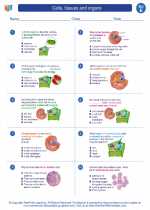
 Worksheet/Answer key
Worksheet/Answer key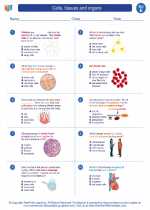
 Worksheet/Answer key
Worksheet/Answer key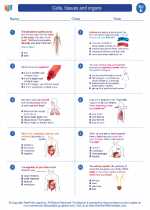
 Vocabulary/Answer key
Vocabulary/Answer key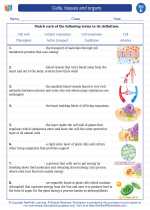
 Vocabulary/Answer key
Vocabulary/Answer key
 Vocabulary/Answer key
Vocabulary/Answer key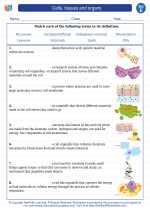
 Vocabulary/Answer key
Vocabulary/Answer key
 Vocabulary/Answer key
Vocabulary/Answer key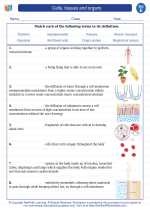
 Vocabulary/Answer key
Vocabulary/Answer key
